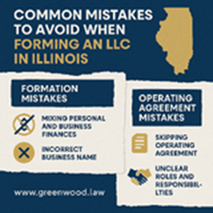Forming a Limited Liability Company (LLC) is a popular choice for small business owners in Illinois. It offers flexibility, liability protection, and tax advantages—but only if it’s done correctly. Unfortunately, many entrepreneurs make avoidable mistakes during formation or when drafting their operating agreement, which can lead to legal disputes, financial setbacks, or even the loss of liability protection.
Here are the most common pitfalls—and how to avoid them.
Mistakes During LLC Formation
- Skipping the Operating Agreement: Even single-member LLCs benefit from a written operating agreement. Without one, disputes are harder to resolve, and Illinois courts may apply default rules that don’t reflect your intentions.
- Mixing Personal and Business Finances: Using personal accounts for business expenses can pierce the LLC’s liability shield. Always maintain separate bank accounts and financial records.
- Ignoring State-Specific Requirements: Failing to file annual reports, maintain a registered agent, or comply with local licensing rules can result in fines or administrative dissolution.
- Not Paying Estimated Taxes: LLC owners must make quarterly tax payments. Missing these can lead to IRS penalties and financial strain.
- Poor Recordkeeping: Inadequate documentation—like missing meeting minutes or financial statements—can hinder growth and trigger audits.
- Misclassifying Workers: Treating employees as independent contractors to avoid payroll taxes can lead to audits and legal liability.
Mistakes in LLC Operating Agreements
- Using a Generic Template Without Customization: Templates often fail to reflect your business’s unique structure, roles, and financial arrangements. Customization is essential.
- Unclear Member Roles and Responsibilities: Vague or missing descriptions of who does what can lead to confusion and conflict. Define decision-making authority, voting rights, and operational duties clearly.
- Failing to Address Capital Contributions and Profit Sharing: Disputes often arise when contributions and distributions aren’t spelled out. Your agreement should detail who contributes what and how profits/losses are allocated.
- Neglecting Buy-Sell Provisions: Without exit strategies, member departures can trigger legal battles. Include terms for valuation, transfer rights, and succession planning.
- Overlooking Tax Implications: Choosing the wrong tax classification or failing to address tax obligations among members can lead to unexpected liabilities.
- Ignoring Dispute Resolution Mechanisms: Without a plan for resolving disagreements, internal conflicts can escalate to costly litigation. Include mediation or arbitration clauses.
- Not Addressing Intellectual Property Ownership: If your LLC uses or creates IP, clarify who owns it and what happens if a member leaves.
- Failing to Include Amendment Procedures: Your agreement should include a clear process for making changes as your business evolves.
- Signing Without Legal Review: Many owners sign agreements without fully understanding them. Always consult a business attorney before finalizing your operating agreement.
Final Thoughts
Forming an LLC is a smart move—but only if you take the time to do it right. A well-drafted operating agreement and proper legal setup can protect your business, your relationships, and your future.
📞 Need help forming your LLC or reviewing your operating agreement? Contact Greenwood Law today or visit www.greenwood.law to schedule a consultation.

